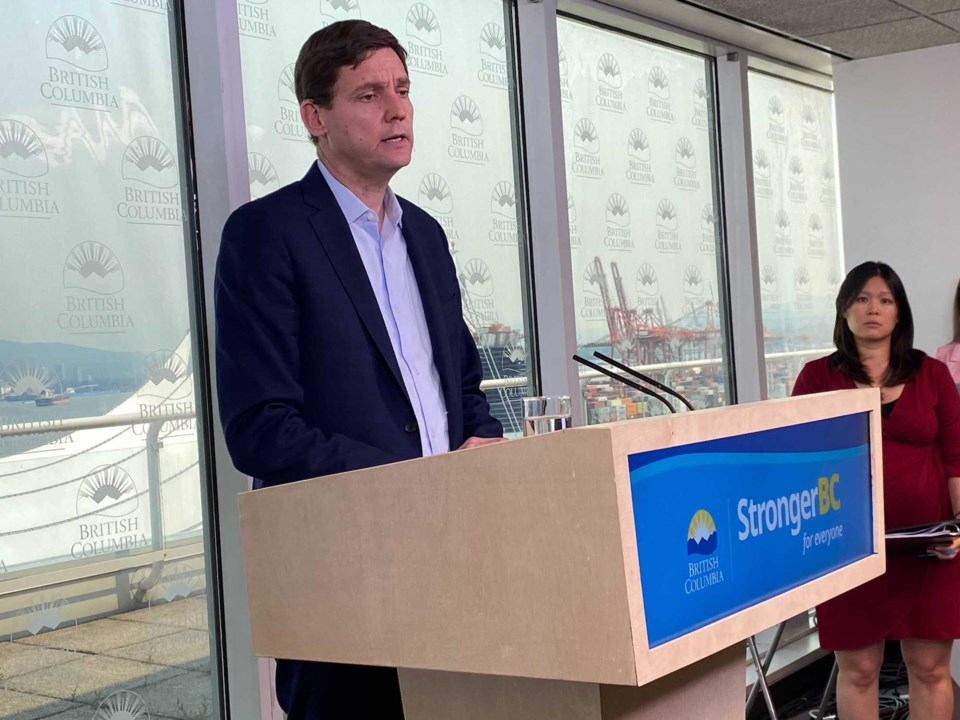Premier David Eby joined Prime Minister Justin Trudeau Monday in criticizing Meta, the parent company of Facebook and Instagram, for blocking news of wildfire emergencies in sa国际传媒
“I find it so unacceptable, that the ban is still in place. It feels a bit like they're holding British Columbians for ransom, to make their point with Ottawa,” said Eby at a press conference in Vancouver Monday.
In response to the leaders, Meta said Monday it remains committed to ending news sharing on its websites and would not make changes to that policy. Meta suggested people look elsewhere for wildfire news.
“Canadians can continue to access news online by seeking out the websites of news outlets, downloading mobile news apps and subscribing to their preferred publishers,” wrote the social media company in response to questions from Glacier Media.
Meta’s ban on news links on its websites is in response to the federal government’s Online News Act. Bill C-18 imposes a payment on social media companies to news organizations for news links shared on their websites. The move is an effort to compensate news media organizations for the advertising revenue Meta and Google generate from news content.
After the bill passed this year, Meta opted to block news so as not to pay the so-called “link tax.” In recent weeks, that decision has shut off access to the social media accounts of several Canadian news organizations.
“I find it astonishing,” said Eby, “that we are at this stage of the crisis and the owners of Facebook and Instagram have not come forward and said, ‘Look, we're trying to make a point to the federal government but it's more important that people are safe. It's more important that they have access to basic information through our networks, and that we can deal with our concerns with the federal government and their new laws later.’”
'Meet people where they're at'
Also at the press confernce, sa国际传媒 Minister of Emergency Management and Climate Readiness Bowinn Ma said that while the government has several communication tools, social media was critical.
“I think that it's important from an information perspective to meet people where they're at. And a lot of people are out on social media,” said Ma. “And so, it is an important tool. At the same time, it is not the only tool that we provide.”
Ma pointed to the province's abilitt to issue “broadcast intrusive alerts” that push messages to people’s digital devices, radios and televisions.
Media policy expert Alfred Hermida, a professor at the University of sa国际传媒’s School of Journalism, Writing and Media, said any communications problems the government is facing due to Meta’s ban on news links is one of their own making.
“At the hearings (on Bill C-18) they heard this was flawed legislation but they went ahead with it anyway,” said Hermida.
Hermida said the Australian government faced similar problems when it tried to impose a tax on Meta. But before news was blocked, the government there “blinked and basically changed the way the law was going to be applied.”
On Monday, Trudeau said it was “inconceivable” that a company like Facebook is choosing to put corporate profits ahead of ensuring local news organizations can reach Canadians with up-to-date information.
Glacier Media asked the Prime Minister’s Office if the government would lift any requirements of the Online News Act should Meta lift its ban during the emergency. The office did not respond by publication time.
Meta says Facebook still useful in an emergency
Hermida said he sympathizes with Trudeau and Eby but ultimately the problem rests with the federal government’s legislation.
“They’re saying to Meta, ‘You have to take back the news and when it’s back, please pay us for it.’ It doesn’t make any sense,” he said.
Hermida said one silver lining may be that the impact of the ban is likely less so now than a few years ago, as Facebook users increasingly get their news less often on Facebook.
“It used to be about 40 per cent, now it’s 29 per cent,” said Hermida. “Facebook as a news source has become less important for Canadians.”
He added: “In a crisis situation, people will find a way to getting this information.”
As for Meta, the social media giant says Facebook users are still turning to the platform to communicate, despite the news ban. The company pointed to Facebook’s “safety check” tool as evidence it was still useful to people in an emergency.
“So far more than 45,000 people have marked themselves safe and around 300,000 people have visited the Yellowknife and Kelowna Crisis Response pages on Facebook...,” stated the company.
Meta also said people can use its technology to “request support, check on loved ones and access information from official government agencies, emergency services and non-governmental organizations.”

